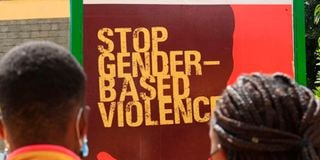Premium
We should use new global model to tackle violence against women

An awareness creation campaign against gender-based violence (GBV) in Nyeri Town on June 28, 2021. Instances of GBV have gone up in the last year since the Covid-19 outbreak.
What you need to know:
- The pervasiveness of violence against women and girls has led to acquiescence that it is somehow inevitable or impossible to end.
- Over the last year, the Spotlight Initiative to eliminate violence against women and girls has delivered notable results in 25 countries.
As the world grapples unevenly with the effects of Covid-19, a parallel and equally horrific pandemic has threatened half the world’s population. In the early months of the pandemic, the United Nations projected that quarantines and lockdowns could lead to a shocking 15 million additional cases of gender-based violence every three months. Sadly, those predictions appear to be coming true.
This week, beginning today, world leaders and others will gather at the Generation Equality Forum in Paris and online in a massive push for gender equality. At that meeting, I will call on states, companies and individuals to join in a global initiative, with proven results, to end the fear and insecurity that threaten the health, rights, dignity and lives of so many women and girls.
From domestic violence to sexual exploitation, trafficking, child marriage, female genital mutilation and online harassment, violent misogyny has thrived in the shadow of the coronavirus pandemic. Full data will take time to collect and assess, but the trends are clear. In 12 countries tracked by the UN, cases of violence against women and girls reported to various institutions last year increased from 2019 numbers by 83 per cent and cases reported to the police by 64 per cent.
In the first months of the pandemic, calls to helplines increased by an average of 60 per cent across the European Union. Calls to Peru’s sexual violence hotline almost doubled last year, compared to 2019. In Thailand, the number of clients visiting domestic violence crisis units in hospitals in April 2020 more than doubled from the same period in 2019.
Such statistics and stories span the world, adding to an existing epidemic of violence against women and girls. Before the pandemic, the World Health Organization estimated that one in three women would experience male violence in their lifetime. Just over a year ago, I raised the alarm. Echoing my call for a global ceasefire, I appealed for peace in the home — an end to violence everywhere, from war zones to people’s homes — to allow us to face the pandemic, humankind’s common enemy, with solidarity and unity.
Pervasiveness of violence
More than 140 countries expressed support: 800 measures have been adopted in 149 countries, mostly focused on shelter, legal assistance and other services and support. However, in many cases, these actions have been limited and short-lived. Worse, other countries are retreating, rolling back legal protections and standing by as violence is used to target women, including human rights defenders protesting these reversals.
The pervasiveness of violence against women and girls has led to acquiescence that it is somehow inevitable or impossible to end. This is as outrageous and self-defeating as it is plain wrong. Despite the challenges of the past year, the UN, with significant funding from and partnership with the EU, has demonstrated that change is possible.
Over the last year, the Spotlight Initiative to eliminate violence against women and girls has delivered notable results in 25 countries. Eighty-four laws and policies to protect women and girls were adopted or strengthened. Prosecution of perpetrators increased by 22 per cent. Some 650,000 women and girls received services despite lockdowns and mobility restrictions.
Close to 900,000 men and boys — including traditional leaders, heads of religious institutions, male taxi drivers and young gamers — were engaged to be allies in finding solutions. Across these countries, national budget allocations for preventing and responding to violence against women and girls increased by 32 per cent, a clear indication of sustainability.
By coming together from today to Friday in Paris, around a proven model, we can begin to ensure that the next generation of girls will not be expected to live with fear simply because we didn’t act. In time, there will be many lessons learnt about what the world got right, and wrong, in handling this pandemic. One of the first must be to ensure that this disgraceful hidden pandemic that half our population faces ends now.
Mr Guterres is the Secretary-General of the United Nations.





